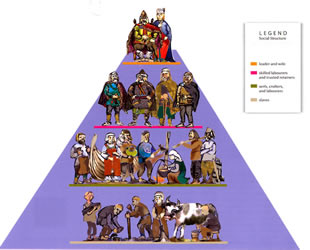Sociologists have created many terms that help us understand society, since society is so complex and such a big concept, we view it by different parts; we try to see its structure, its types and its characteristics. It is now of extreme importance to understand what roles and statuses are as well. A status “is a socially defined position in a group or society.” Role, is the other main element of social structure, a role is “the behavior-rights and obligation-expected from someone occupying a specific status.” Within statuses and roles, there are many types of each, you don’t simply say status, and there are many different categories in which status is divided. Aside from this, we already defined social structure as the statuses and roles that lead to human interaction, we might as well call human interaction, social interaction.
There are basically two types of statuses: Master Status; Ascribed and Achieved Status. Achieved and Ascribed Statuses both fall under the same category. Ascribed Statuses are those that you can’t control and have no power over, they are statuses that you inherit and which you don’t need any effort or skill to reach. Your gender, for example, is an ascribed status, because you can’t choose either to be a male or female, but you do get that status depending on your gender. The status of a teenager, or of adult, that is also a ascribed status, you have no control over you age. Achieved statuses are those that individuals gain thanks to their efforts, special skills or knowledge. Master statuses are different. A person usually has many statuses, but the master status is the one that is most influential in your life. The status that will most probably shape your way of life and influence you most, is your master status. A father, wealth, marital status; all these are common master status.
A role is just as important as status when referring to social structure.Roles are how you act because of your status, since you occupy the role of a student, you are expected to study and to behave well, behaving well and studying are part of your role as a student. A person, in most cases, has reciprocal roles, which “are corresponding roles that define the patterns of interaction between related statuses”, in other words, sometimes you need another person to accomplish your role. Role expectation is the role you are expected to perform according to your status. Role performance is their actual role behavior. Sometimes we have a status that makes us have to perform many roles, this group of roles is called role set. Role conflict is when you can’t fulfill one role completely because you are trying to fulfill another role, finally, role strain is when you only have one role and yet you still can’t fulfill that role.
 The role that you will have by the status in where you are.
The role that you will have by the status in where you are.Sociologists recognize five different types of social interactions. Exchange, Competition, Conflict, Cooperation and Accommodation are the five types of social interaction. Exchange is the most common form of interaction, it includes dating, friendship, family life; exchange is when you interact with an effort to receive a reward for your actions, the reward might even be a simple “thank you”. Competition occurs when two or more people or groups oppose each other to achieve a goal that only one can attain. Conflict interaction, refers to the deliberate attempt to control a person by force, to oppose someone, or to harm another person.
Societies are very complex, but after all, we, as
individuals make society, and choose how our society will be, we have statuses
and roles that define our social interactions and shape our societies, we look
more up to status than to role, we try to leave a good role aside and ignore
the collapsing society. Society might be very complex, big, and one individual
might not change it, but the role of many, their relations, and their statuses
have formed the society we know today.